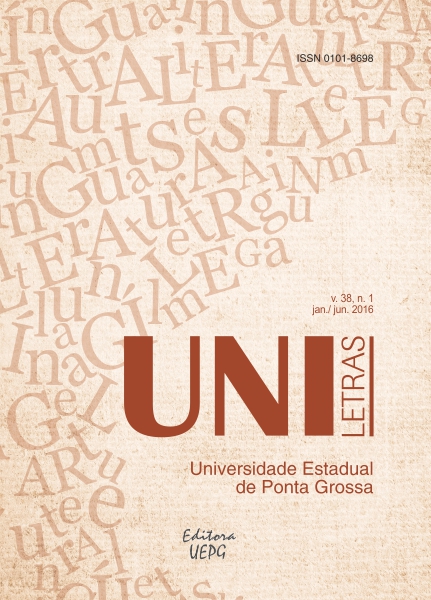Dicionários bilíngues escolares: o tratamento dado aos falsos amigos
DOI:
https://doi.org/10.5212/uniletras.v38i1.9144Abstract
O dicionário é um instrumento fundamental para a aquisição de vocabulário e cultura de uma língua, assim, acreditamos ser quase impossível aprender uma Língua Estrangeira sem o auxílio de um ou mais dicionários. O uso de um Dicionário Bilíngue em sala de aula tem sido debatido por estudiosos da linguagem e lexicógrafos (AMARAL, 1998; DURAN, 2008; FIALHO, 2005; FERREIRA, 2006; VITAL, 2006; WERNER, 2006; XATARA, 2011; VITA, 2005). No caso do português e do espanhol, línguas com inúmeras semelhanças, esta questão ainda é mais desafiadora, sobretudo quando surgem os Falsos Amigos. Este artigo teve como objetivo analisar o tratamento dado aos Falsos Amigos em três Dicionários Bilíngues Escolares de Espanhol/Português e Português/Espanhol. Inicialmente avaliamos as propostas e em seguida verificamos qual o tratamento dados aos Falsos Amigos. Embora a Lexicografia Pedagógica e Bilíngue tenham trazido contribuições fundamentais para os Dicionários Escolares Bilíngues, as conclusões apontaram algumas falhas nas obras analisadas.
Palavras-Chave: Dicionário Bilíngue Escolar; Ensino de Língua Espanhola; Falsos Amigos.
Downloads
Downloads
Published
Issue
Section
License
Authors that publish in the journal agree with the following terms:
a) The authors keep the copyright and grant to the journal the rights of the first publication, with the work simultaneously being licensed under the Creative Commons Attribution License that allows the sharing of the work with the recognition both of the authorship and the initial publication in this journal.
b) This journal provides immediate public access to all of its content, following the principle that making scientific knowledge freely available to the public provides greater worldwide democratization of knowledge. For more information about this approach, visit Public Knowledge Project, a Project that developed this system to improve the academic and public quality of research, distributing OJS as well as other softwares to support the publication system to public/open access to academic sources. Names and e-mail addresses in this website will be used exclusively for this journal purposes, not being available for other ends.

This work is licensed under a Creative Commons Attribution 4.0 International License.





